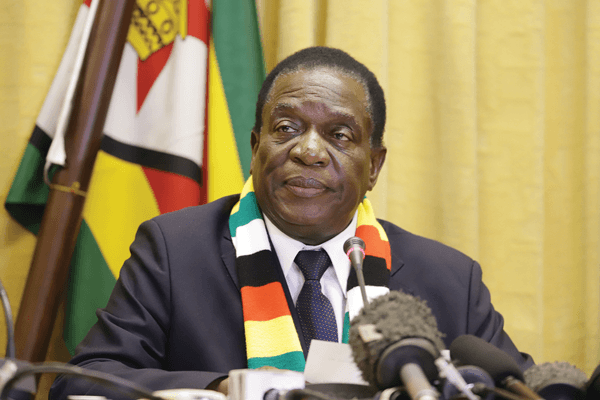
guest column Paidamoyo Muzulu
PRESIDENT Emmerson Mnangagwa is a man on a mission — changing the judicial landscape as much and as quickly as he can. The changes are coming at an alarming pace, but Zimbabweans are too preoccupied by other pressing issues like the deteriorating economy to notice that the President is fashioning the judiciary to his liking for the next generation.
The man appears to be in such a hurry to rival, if not to undo former President Robert Mugabe’s judicial appointments and remake the bench in his image. Mugabe inherited the bench from the Rhodesia and judges in Zimbabwe are tenured, serving until up to 70 years.
Assuming that the average age of Justices being appointed by Mnangagwa is 50, it can be argued that they would continue to shape legal jurisprudence for the next two decades.
In less than two years since he took over power following a coup in November 2017, Mnangagwa is set to appoint his 20th justice before end of August following High Court interviews this week.
In December 2017, Mnangagwa made his first appointments, eight High Court judges namely: Philda Muzofa, Sylvia Chirawu, Pisirayi Kwenda, Neville Wamambo, Thompson Mabhikwa, Benjamin Chikowero, Jacob Manzunzu and Isaac Muzenda.
Five months later, in May 2018 Mnangagwa appointed two Supreme Court judges; Justices Francis Bere and Lavender Makoni.
Last week, he made two more appointments to the Supreme Court bench in the form of Justices Nicholas Mathonsi and Charles Hungwe.
- Chamisa under fire over US$120K donation
- Mavhunga puts DeMbare into Chibuku quarterfinals
- Pension funds bet on Cabora Bassa oilfields
- Councils defy govt fire tender directive
Keep Reading
The President is expected to make eight more appointments to the High Court bench as early as next month, after the interviews.
High Court seats have been increased through the addition of Masvingo and Mutare to Harare and Bulawayo circuits, respectively. While these appointments and changes may seem inevitable, Mnangagwa appears to be having his way on the appointments.
Considering the aforesaid, one wonders whether the judiciary is still independent, taking into consideration the appointment criterion.
Judicial appointments are made in terms of Section 180 of the Constitution. The President has unfettered powers in making appointments to the bench, he appoints all judges. Section 180(3) reads: “If the President considers that none of the persons on the list submitted to him in terms of subsection (2)(e) are suitable for appointment to the office, he or she must require the Judicial Service Commission (JSC) to submit a further list of three qualified persons, whereupon the President must appoint one of the nominees to the office concerned.
From a theoretical perspective, the President may seem guided by the JSC in making the decision, but in reality he wields so much power and the case of the appointment of the current Prosecutor-General, Kumbirai Hodzi, is more informative.
Hodzi shocked the public during interviews when he said, as acting PG, he took instructions from the Executive despite the Constitution clearly spelling out that the occupant of the office should be independent in decision-making and without interference from anyone.
Hodzi came out number six according to the JSC scorecard after public interviews, but still got the top job. Mnangagwa, using section 180(3) of the Constitution, duly exercised his powers to refuse the first set of three names under the broad reason that all the persons on the list submitted to him in terms of subsection (2)(e) were unsuitable for appointment to the office.
The JSC, in line with the Constitution, sent a second list that included Hodzi and, then, he was duly appointed.
The reason for the refusal of the first nominees list was never made public, but it can be speculated they were not politically correct.
There is nothing that could be amiss to argue, Mnangagwa may be pulling the same stunt in the appointment of the eight judges next month. It’s not naïve to assume the appointees would be politically correct.
Disturbingly, in its interviews, the JSC never asks questions that may shed the ideological inclinations of the candidates. The public is not aware of their thoughts on say abortion, nationalisation of assets (land) or how they view rights like access to water, health or education.
Mnangagwa, with the benefit of hindsight, wants unfettered powers in the appointment of judges. This was made clear to all and sundry when as Justice minister, he steered Constitution Amendment No. 1 which empowered the President to appoint the Chief Justice, Deputy Chief Justice and Judge President after consulting the JSC, but the President’s decision is final even when he departs from the advice of the JSC.
Whichever way one looks at it, Mnangagwa has his ducks in a row on the judiciary. His shadow shall be cast on all judgments for the next 20 years at minimum. He has stealthily shaped Zimbabwe’s legal landscape while the citizens are busy dealing with matter of the stomach. They might just find that they have lost plenty of rights by the time they look up from their empty plates.











